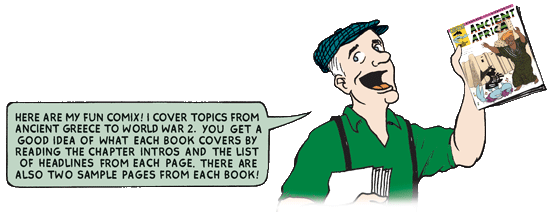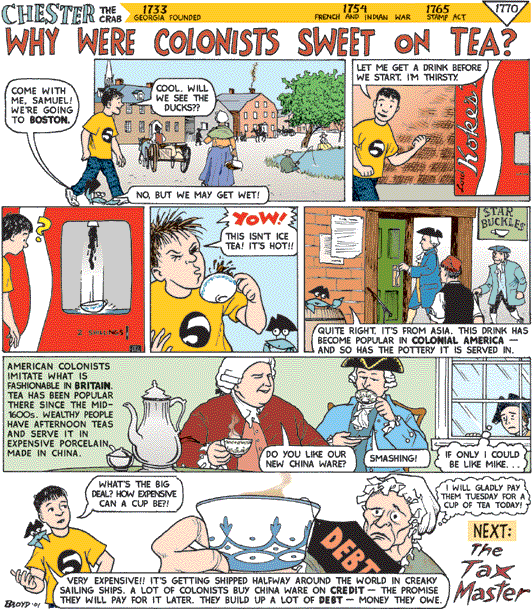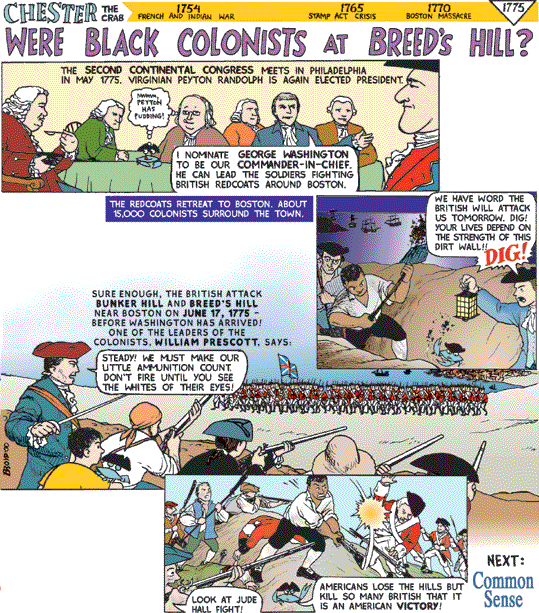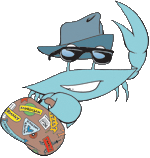

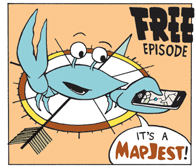

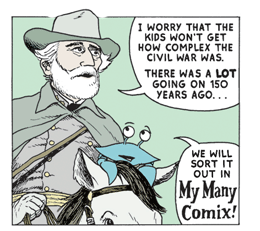
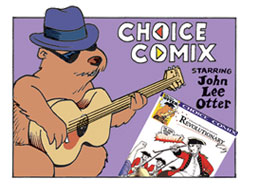
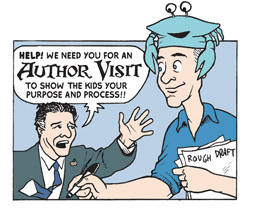

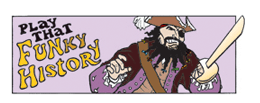

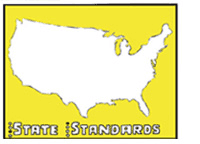


|
|

|
 |
||
 |
"The kids at the bus stop were talking about your presentation. I loved how you addressed them so interactively." Christine, a mother from Virginia |
|
|
|
||
Revolutionary Rumblings
Why did guys in powdered wigs argue over a breakfast beverage?!?! Chester the Crab shows the road to the American Revolution – how money arguments became political arguments and then became shooting arguments. The colonial conflict begins in the French and Indian War, then moves to the Boston Massacre and Boston Tea Party and finally follows Paul Revere towards the writing of the Declaration of Independence. This funny, colorful graphic novel will excite reluctant readers, prepare students for standardized tests in history and help homeschooling parents!
Comic sample page #1: Why were colonists sweet on tea?
Comic sample page #2: Were black colonists on Breed’s Hill?
Topics covered in this comic book
View the Teacher’s Guide for this comic
Chapter 1: The French And Indian War
British redcoats march into the North American woods many years before 1776. This French and Indian War is a fight to see which empire will control North America. Will it be the French and their American Indian friends or will it be the British and their American colonists? The leaders and lessons of this war will soon lead to another war in these woods . . .
French and Indian War includes the following topics:
How did the French and Indian War begin?
How did Washington learn warfare?
When did the French and Indians split?
How did Britain win the war?
Who paid for the French & Indian War?
Chapter 2: The Boston Tea Party
The American colonists who complain the loudest about the new British taxes are from Boston, Massachusetts. These proud Puritans and patriots demand “No Taxation Without Representation” – and they are willing to take their argument to the violent streets if they must!
The Boston Tea Party includes the following topics:
Why were colonists sweet on tea?
Who paid for the French & Indian War?
Who had a monopoly on tea?
When was the Boston Tea Party?
Did more colonies throw tea parties?
Sources: The Boston Tea Party by Walter Oleksy, 1993; The Boston Tea Party in American History by Mary Hull, 1999; The Shoemaker and the Tea Party by Alfred Young, 1999; Colonial Williamsburg magazine, Spring 1996; Grolier Encyclopedia
Chapter 3: Paul Revere, Rider
One of the bravest Bostonians is Paul Revere. His father came to Boston from France to start a shop for making things out of silver. Paul takes over the family business. But the patriotic fire in Boston pulls him from his shop and onto the trail of freedom. Revere becomes the rider, the spy, the messenger, the alarm, the warning bell of the American Revolution . . .
Paul Revere, Rider includes the following topics:
Where did patriot Paul Revere live?
Why did Bostonians fight Redcoats?
How well did Paul Revere ride?
Who saw two lanterns Boston?
Who wins Lexington and Concord?
Chapter 4: A Declaration!
Even after “The Shot Heard ‘Round the World,” many American colonists do not want total independence from England. The steps toward independence come one at a time. And sometimes the ideas are pushed by what is happening on the battlefield. Will Americans finally get their rights inside the British government — or outside it?
A Declaration! includes the following topics:
Who was the 1st Continental Congress?
When did colonists get fired up?
Were Black Colonists at Breed’s Hill?
Who wrote America’s Declaration?
What did Jefferson declare in 1776?
Sources: Colonial Williamsburg magazine, Winter 1992-93; Colonial Williamsburg magazine, Spring 1993; Colonial Williamsburg magazine, Spring 1996; Britannica.com; Daily Press newspaper, Newport News, VA, June 13, 1999

